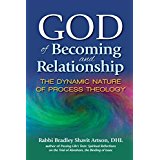In Process theology, God’s power is persuasive, not coercive. This means that God does not break the rules to force a desired outcome, but works in, with and through us.
God and law: Whenever we talk about God’s might, we must also celebrate God’s willingness to live within law. God does not break the laws of physics, chemistry, biology, or morality. God establishes these laws and works within their limits.
The lure and choice: God also works at every moment for the best possible next step, through the lure that invites our next choice. We have the opportunity and freedom to decide whether to take that step or not.
How do we perceive the lure? “We know what the initial aim is because we prehend it, Whitehead’s term for immediate, internal intuition. We do not have to be told; we are each connected to all and to the creative-responsive love that God offers. So we intuit the lure from the inside…” (see God of Becoming, p. 18 )
Thus God’s power is unique, and qualitatively superior to human power. God does not use power in the way that humans think of power. In Scripture we meet a dynamic, relating God who suffers, who becomes vulnerable in having created us. The best way to describe God as a covenant partner is in the language of love and law; and so in the Torah, the interconnection between God, humanity, and all creation is expressed in brit – the dynamic covenant between God, humanity, and all creation. (p. 19)
In chapter 3 Artson writes, “Scripture shows God suffering and rejoicing in the world and with the world (see Isaiah 63:9 and 91:15). Hosea’s story shows us that to love someone is to become vulnerable. Just as we can be hurt by rejection of bad choices, God is hurt – and even diminished – by our wrongful choices. (p. 19-20)
Hosea 2:14-23: On that day, says the Lord, you will call me, “My husband,” and no longer will you call me, “My Master.” …. And I will take you for my wife forever; I will take you for my wife in righteousness and in justice, in steadfast love, and in mercy. I will take you for my wife in faithfulness; and you shall know the Lord. (For Hosea’s full story, read chapters 1 – 14)
What kind of God do you find here?



Artson’s belief is very similar to the 18th Century Deist belief that God created the world in six stages, but that in the current seventh stage God is resting and has left the world to be governed by Natural Law. Artson goes further in that he believes that God is involved along with mankind in the application of natural laws and in the adoption and application of the laws of nations and municipalities. I wish that God was as flexible as Artson describes, a God who may make mistakes and corrects them through evolution and persuasion. That would be praying for the best. Preparing for the worst is that mankind has definite limits; God does not. God is the script writer and director for people’s role in life and their aspirations.
Jared, thank you for your contributions to this blog. We look forward to meeting you (and hearing you) in tomorrow’s discussion. Donna Ross